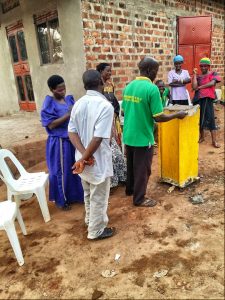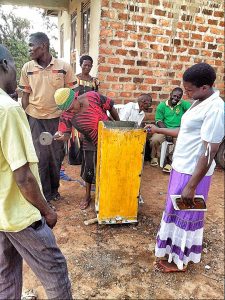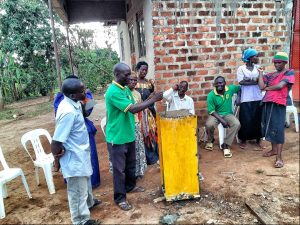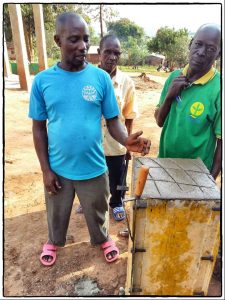This Uganda project is made possible through the partnership of Water Charity and the National Peace Corps Association, working with Friendly Water for the World.
It has been successfully completed, and a short #conclusion report has been appended to the end of the page.
![]()

Location
Ndiraweru-Banda Sub County, Uganda
Community Description
Ndiraweeru is an impoverished rural community in Uganda. They have quite a few issues with water access and quality.
Problem Addressed
Lack of access to clean drinking water, and the subsequent reliance on substandard, contaminated water has created a high incidence of water-borne illnesses. Many of the residents are dealing with compromised immune systems due to HIV and other illnesses, so this is an even greater issue for them.
Project Description
The project will be a 5-day training in constructing and maintaining bio-sand water filters for 25 of the group members These original members will pass on the knowledge to other group members with assistance from the Friendly Water area office. The group members are the first target beneficiaries for BioSand Filters. All will act as education and marketing agents to bring about change in the entire sub-district.
Community Organization
Ndiraweeru SMU group is a local initiative group founded as part of the Korean self-help development initiatives in rural Uganda. The group currently has 120 members, which is part of the Seamaul Undongo movement that also stretches to the National level. Water is a huge issue in the area and access to clean drinking water is a vital need. 68 out of the 120 members are HIV positive and access to clean water is even a greater need for them.
Project Impact
The original 25 Group members will be directly impacted; subsequently passing on knowledge to other group members. The group members are the first target beneficiaries for BioSand Filters; they will act as education and marketing agents to bring about change in the entire sub-district. In the long-term, there will be more access to clean drinking water, thus resulting in fewer waterborne illnesses. The group members will be able to sell clean water and filters, as well as teaching other people to do the same.
Volunteer Directing Project
Kaweesi John Paschal
 Monitoring and Maintenance
Monitoring and Maintenance
The project manager will directly be responsible to coordinate the group activities, and report to the Friendly Water office, which shall send an evaluation officer once a month for the first year. The trained group will be formed into a Rotary Community Corps under the direct supervision of the Rotary Club of Mityana. The club will also offer additional funding for capacity building. The group already has ongoing Water Sanitation and Hygiene projects, which will all be integrated into one program.
An effort will be undertaken to form a group of community health promoters from the trained group. They will continuously do sanitation and hygiene talks in village meetings and other gatherings.
Expected Outcomes:
Short-term
-Environmentally conscious people that will foster environmental hygiene and sustainability
-25 Trained BioSand filter technicians
-Group that can take charge of its local water problems
-At least 120 filters to be built in less than 3 months
-A community with minimized waterborne diseases
Long-term
-Improved lives of families (healthier people )
-Regular school attendance due to the reduced incidences of water-borne diseases
-An economically more productive population
– People with HIV will have regular access to clean water and will live longer.
-Community Health promoters to be formed from the trained group
Comments
This project is part of Water Charity’s ongoing Training & Support Initiative and represents a forward-thinking, efficient way to solve a problem. Rather than simply give the people filters, we are teaching them to make their own and giving them the ability to pass on this knowledge. As such, the final “ripple effects” of this work may never be truly known. Considering how necessary clean water is, and how much the people want to be self-sufficient, we are sure this simple technology will spread broadly and quickly in the region. It is quite likely that thousands of people will be touched by this effort.

Conclusion Of The Project
 The project took place on August 14th and it was a great success among the group that 38 people ended up taking the training instead of the 25 people initially registered.
The project took place on August 14th and it was a great success among the group that 38 people ended up taking the training instead of the 25 people initially registered.
6 filters were made during the training, and 2 molds were delivered to the group. They are already distributing filters as fast as they can make them, and are keen on purchasing more molds and tools.
As with many of these training, despite our willingness to provide more molds and tools free of charge, the people prefer to use the funds they are now able to raise to expand their production themselves. This speaks to the reason these trainings are so successful, as they empower the people to help themselves.
The group has great plans in training the rest of the members, and other groups in other districts. We will update this page further as new information comes in from Uganda.
![]()
This project has been paid for by an anonymous donor. If you are inspired by this what this project was able to accomplish, please Donate to support our future projects in Uganda.